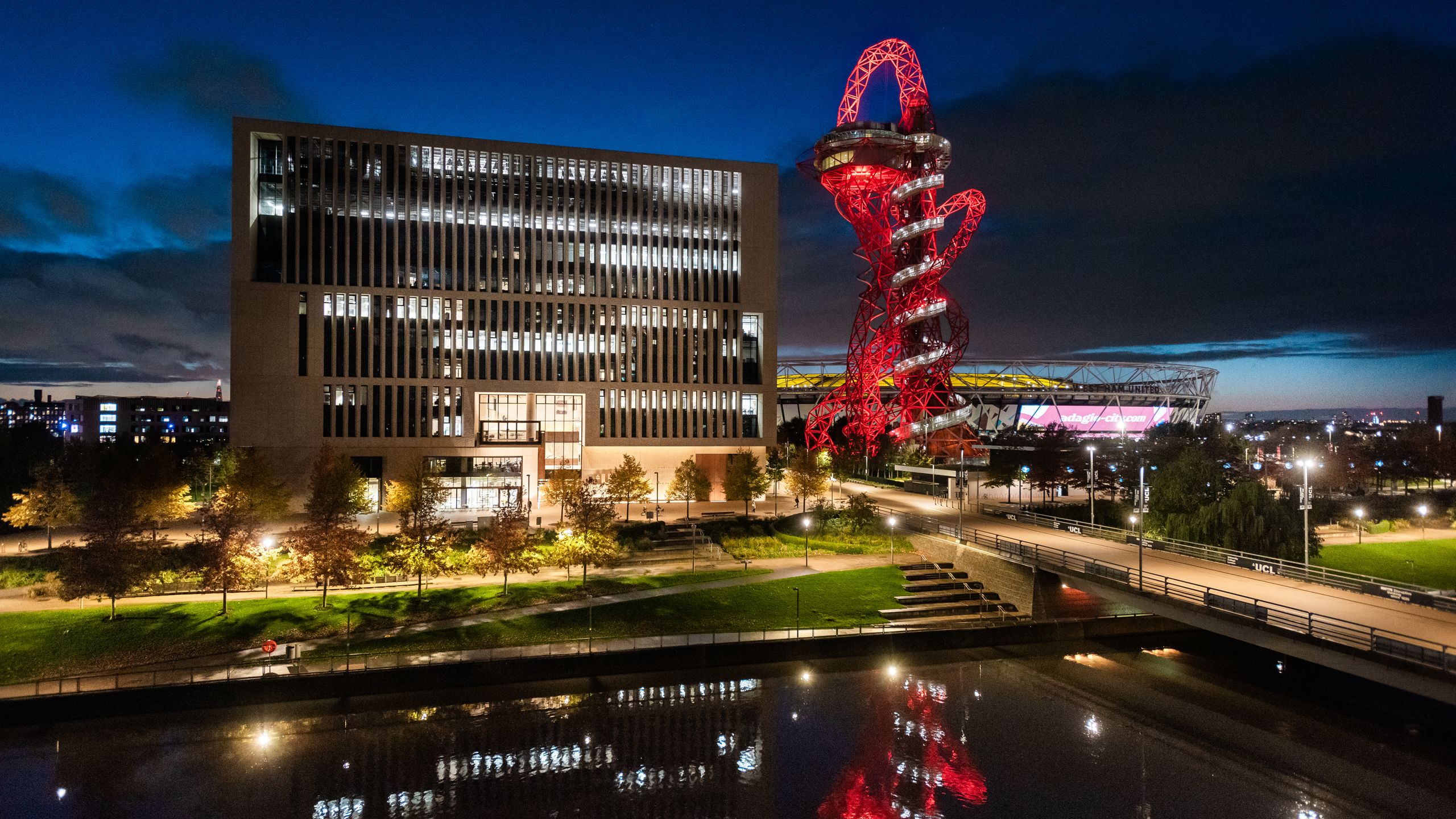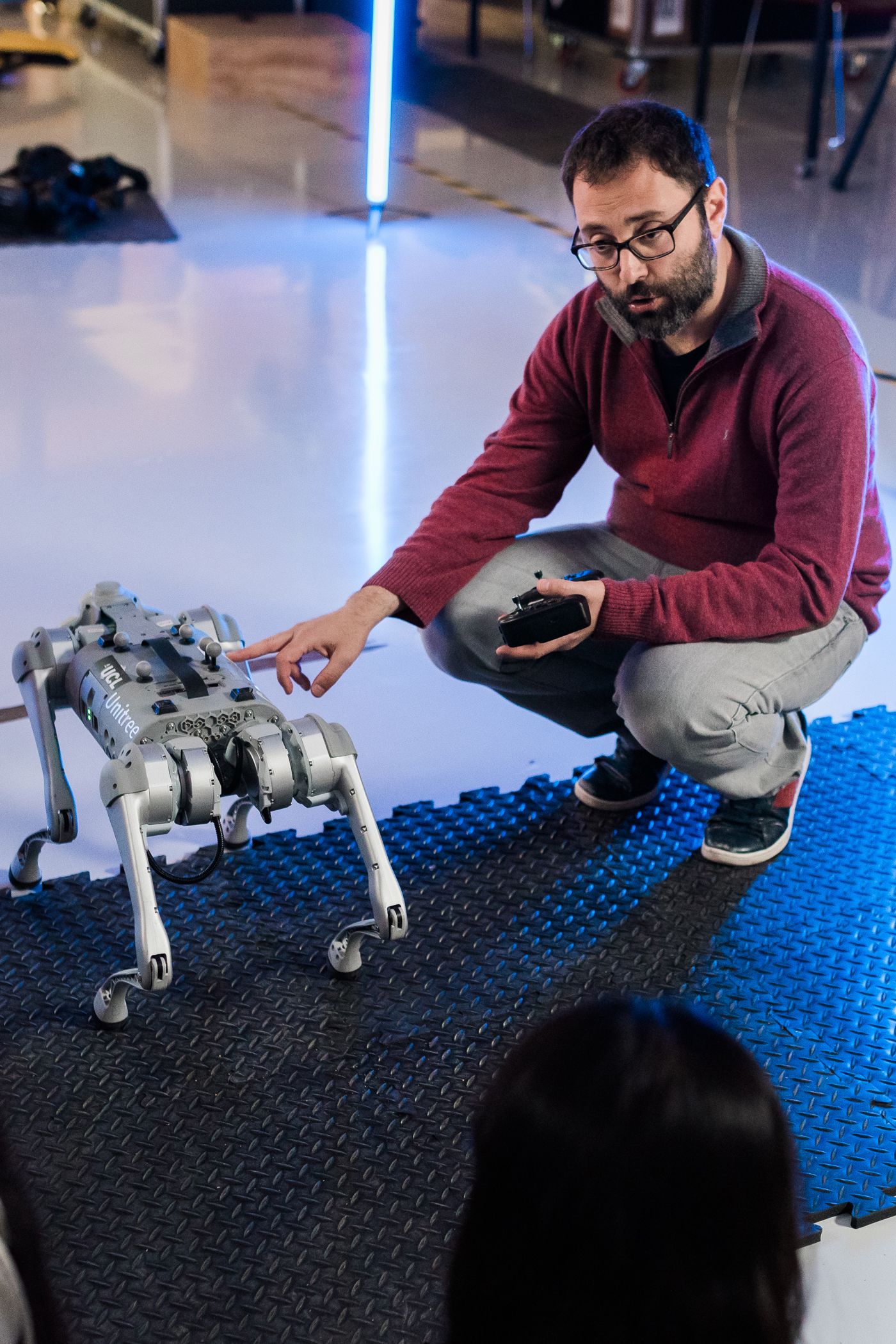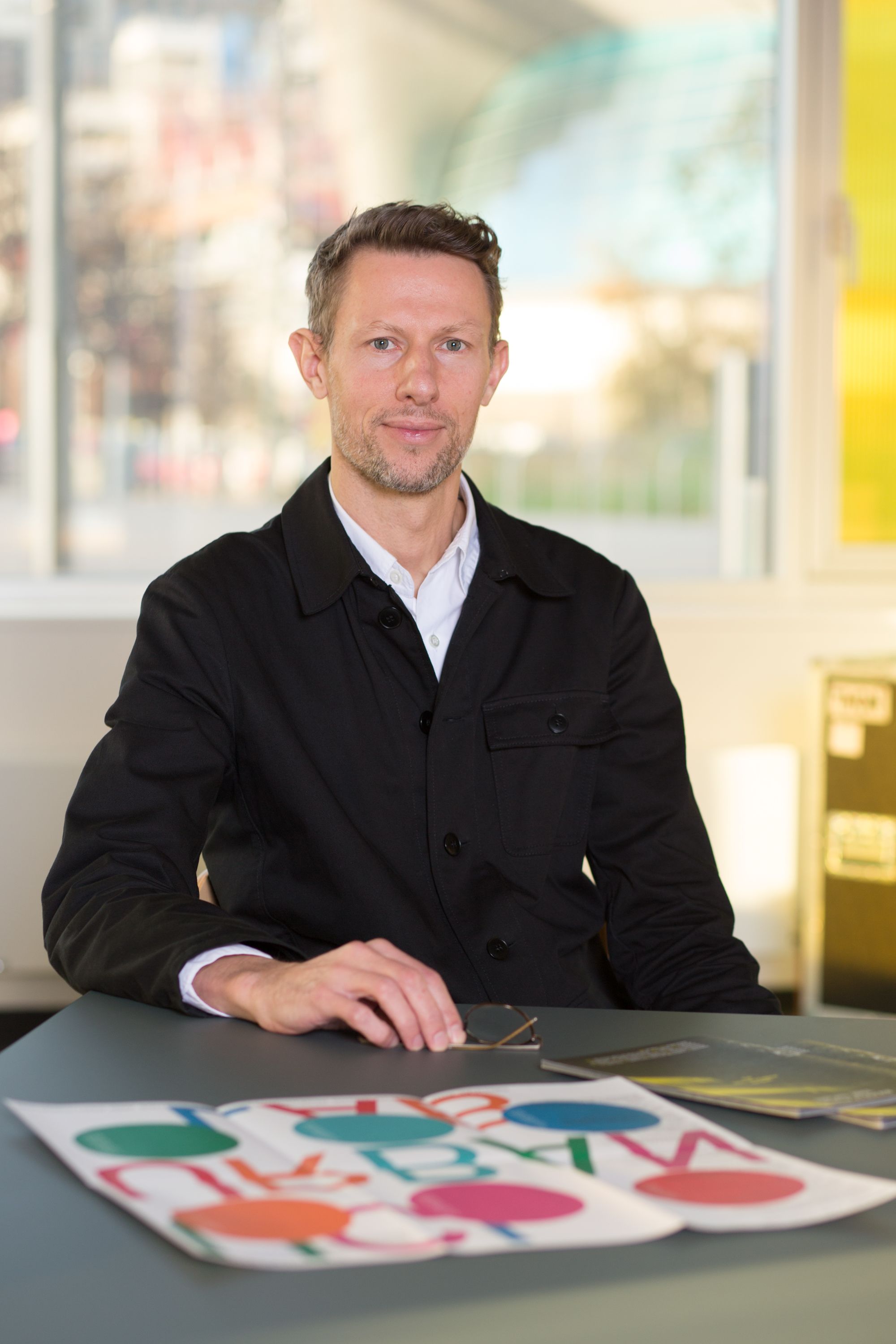Made in East London
Since opening in Autumn 2023, UCL East has helped to redefine the role of a 21st-century university. Here, we meet five of the academics who shape lives, London, and the world from their new base in Stratford.

Professor Paola Lettieri. Image: John Moloney
Professor Paola Lettieri. Image: John Moloney
Professor Paola Lettieri
Pro-Provost (UCL East)
As an undergraduate studying mechanical engineering in Rome in the 90s, Paola Lettieri was one of only eight female students in a highly competitive class of 300, and had to fight to even get a seat.
For as long as she can remember, she’s seen engineers as people who translate an idea into a design. “Something that isn't only working, but is beautiful and creative,” Paola says. “Engineering, for me, was the expression of that journey.”
Having arrived in the UK as a self-funded research student in 1995, Paola is now an international authority in fluidisation and on life cycle assessments, analysing the long-term impact of certain processes – from the treatment of nuclear waste to disposable face masks and the Royal British Legion’s yearly poppies.
She says: “My aim was to use my engineering skills to enable a better society and benefit the environment, and through our applied research and development I've actually been able to do that.”
Now, in her role as Pro-Provost of UCL East, alongside her Professorship in Chemical Engineering, she’s spearheading an educational revolution on a campus like no other.
From the creation of joint research facilities to the innovative design of the building, the focus is on breaking down boundaries within research and education.
“Our students are future innovators, and to innovate they will have to see problems from multiple perspectives,” says Paola. “UCL East will expose them to different ways of thinking, enabling students to work across disciplines and to share spaces and facilities.”
Beyond the student body, UCL East also has ambitious aims to embed itself within the local community. With widening participation events, recruitment schemes and scholarships for east London residents, the campus has opened its doors with a planned programme of public and community engagement.
“We don't just want to land in the Olympic Park,” says Paola. “We want to arrive as a neighbour that the community interacts with.”
Whether it's developing sustainable cities, or transformative technologies, or improving public health and wellbeing, Paola believes that UCL East marks a new age.
“The fact that UCL East is a reality is absolutely amazing,” she adds. “To be recognised with a title that represents Provost on a new UCL campus… it's the job that I’ve dreamt about.”
This is an abridged profile; read Paola's full profile on the UCL Giving website

Dr Daniel Hajas
Innovation Manager at the Global Disability Innovation Hub
Dr Daniel Hajas and the Global Disability Innovation (GDI) Hub team accelerate disability innovation for a more just world, where Assistive Technology enables the full participation of disabled people.
Daniel has first-hand experience of life with a disability, having had low vision in his teenage years and then finding himself completely blind just before embarking on his university studies.
“[It was] first in my right eye then very shortly after in my left,” he recalls. “I had to learn pretty much everything from scratch, from how to pour a glass of water to how to send an email.”
Daniel was passionate about science, physics, and in particular, mathematics. “So, I had a dilemma,” he says. “Assistive technology for blind people at the time didn’t really read equations, so physics was more challenging than a history degree, for example. But nevertheless, heart won over mind.”
Having taken up a place to study Theoretical Physics at the University of Sussex, Daniel found himself spending a lot of time exploring his own disability.
“I realised that whilst I'm hacking my way through, finding solutions on how to make my own life easier, I can also learn about how to do this for other people. How can I help other blind learners to access science?” he says.
He was subsequently introduced to GDI Hub’s academic director Professor Cathy Holloway by his PhD supervisor, and quickly found it to be the perfect place to put his ideas and skillset into action. In 2021, Daniel began his innovation role.
As the World Health Organisation’s first Global Collaborating Centre for Research on Assistive Technology, the Hub – founded in 2016 as a legacy of the 2012 London Paralympic Games – brings together research from multiple pathways to amplify the value and impact of assistive technology.
“As an interdisciplinary team, we’re able tap into expertise from across UCL. My role in innovation naturally sits in the middle of lots of research strands, enabling a creative multi-disciplinary approach,” Daniel says. “The potential of Assistive Technology to change lives is huge. I’m so excited to see what we can achieve by working with diverse communities within and beyond UCL East.”
As the Hub grows into its new home, Daniel is reflecting on his journey and looking forward to a period of learning and growing in his role. “From my entrepreneurial experience to my lived experience as a blind person to my PhD research, I feel this is the ultimate place I want to be.”
This is an abridged profile; read Daniel's full profile on the UCL Giving website
Dr Daniel Hajas. Image: John Moloney
Dr Daniel Hajas. Image: John Moloney

Dr Dimitrios Kanoulas
Dr Dimitrios Kanoulas
Dr Dimitrios Kanoulas
UKRI Future Leaders Fellow, UCL Computer Science
Working at the frontiers of innovation, Dr Dimitrios Kanoulas and his team at the UCL Department of Computer Science are leading a robotic revolution in east London.
Dimitrios’s long-standing love affair with robotics began in his hometown of Epanomi, Greece – where he spent his first 17 years. His fascination with the world of computing took him to the University of Patras to study Computer Engineering and Informatics in 2003, before heading overseas to Boston, USA for his PhD at Northeastern University in 2008.
“I completely changed my direction of research during my PhD,” he says. “Originally, I was a more theoretical person, working on different aspects of computer science and game theory, and at some point, I got excited about robots, in particular robots that have legs and arms!”
Dimitrios arrived at UCL as a Lecturer in Robotics and Computation just prior to the COVID-19 pandemic. He helped to develop the Robot Perception and Learning Lab alongside students and other staff and was awarded the prestigious UKRI Future Leaders Fellowship to advance the ‘RoboHike’ project.
‘RoboHike’ assesses the potential of autonomous four-legged robots to navigate difficult terrains such as disaster zones where timing and safety are critical. The team is currently focusing on how these machines might use environmental cognition to automate manual labour or dangerous tasks.
With UCL East’s state-of-the-art facilities enabling brand-new programmes in Robotics and AI, and world-leading experts on hand, the mission for Dimitrios is to make sure that the next generation of roboticists have everything they need to shape innovation in the 21st century.
“Robotics is a special case in the science world,” he says. “Some people just need a computer or just a notepad to do their research. We need space. It’s the nature of robotics. So, we couldn’t have developed much further without the facilities of UCL East.”
As the field of robotics becomes more embedded in our everyday lives, Dimitrios is keen that the local community around UCL East gets to experience the team’s robotic innovations first-hand.
He says: “This is a great opportunity to start engaging in a better way – with schools, surrounding hospitals, within the Olympic Park, even with family days for staff at UCL. We want to invite people into our world to inspire the new generation.”
This is an abridged profile; read Dimitrios's full profile on the UCL Giving website

Dr Sada Mire
Associate Professor in Heritage Studies. UCL Institute of Archaeology
Dr Sada Mire leverages cutting-edge research into the past to improve collective futures, enriching the lives of entire communities by protecting and documenting their heritage.
Until recently, Sada was the only Somali archaeologist actively working in Somaliland – taking her back to the region she and her sister were forced to flee due to civil war.
Arriving in Sweden as a child refugee, she had found her inspiration in her attempts to connect with her roots. “I had no idea what archaeology was, and it was only because I read an African history book by Basil Davidson that I understood its importance,” she says. “It said, in order to write African history we need to do archaeological research and I thought, ‘I want to do that!”
Several years later, Sada enrolled at Lund University to study Scandinavian pre-history and archaeozoology. In 2003, her passion led her to the UK, first to study at SOAS University of London (BA, History of Art/Archaeology of Africa and Asia) and then UCL, where she studied for an MA in African Archaeology in 2006 and a PhD in Archaeology in 2009.
As a mature student at UCL, Sada gained new perspectives.
“I’d really started to become aware of the lack of African history in schools and schoolbooks in Europe,” she says. “I always thought of Western education as the pinnacle of knowledge but there was this society-wide gap in African history. This is what really drove me in my career, and it’s still the driver today.”
Today, her work is integral to the preservation of culture and heritage across the Horn of Africa. Internationally recognised, she has been the subject of documentaries, presented TED talks and was included in New Scientist magazine’s list of Inspiring Women in Science.
“One of the proudest moments for me was going back to Somaliland after 16 years,” recalls Sada. “To return to somewhere that I only associated with trauma, to face that, and to truly make something out of it.”
With her UK base moving to UCL East, Sada is excited by the blend of tradition, culture, collaboration and creation on campus.
”We have the potential to start dialogues with the local communities about their heritage, and their experiences. Reaching out to communities that are perhaps not ‘the usual’ – whether it’s Samburu in Kenya or it’s East London – opens up dynamic new ideas for transformation.
“UCL East will bring new energy and new blood into UCL, and to London."
This is an abridged profile; read Sada's full profile on the UCL Giving website
Dr Sada Mire. Image: John Moloney.
Dr Sada Mire. Image: John Moloney.

Professor Ben Campkin. Image: John Moloney
Professor Ben Campkin. Image: John Moloney
Professor Ben Campkin
Vice-Dean of Public and City Engagement, The Bartlett Faculty of the Built Environment
From historic neighbourhoods to thriving nightlife hotspots, cities are made by the communities that live, work, rest and play in them. From UCL East, The Bartlett puts them at the heart of urban change.
Ben has been involved with conversations about UCL East for nearly 10 years, but his journey with UCL began in 1994, when he arrived to study a combined degree of Medieval Archaeology and History of Art.
“UCL’s History of Art department and Institute of Archaeology were dynamic places to study,” he says. “At the time, there were lively discussions which were shaking up these disciplines. I benefited a lot from that.”
Ben would later return to UCL to study for a master's in the Built Environment, specialising in Architectural History, and then a PhD on urban regeneration, between The Bartlett and Geography.
“My PhD focused on urban decline and renewal, specifically around King’s Cross, " says Ben. “This really helped to refine my view of urbanism – thinking about the value of different kinds of knowledge, not just academic but community-based.”
“There is a need to think about different urban experiences in diverse cities and to understand them in relation to technical knowledge, policy and other professional and academic discourses.”
A significant focus of Ben’s recent work has been the experiences of LGBTQ+ populations in relation to urban change in their neighbourhoods and social infrastructure.
“There’s been work on gender, sexuality and cities since the 1960s, with strong synergies between scholarly research and activism around LGBTQ+ spaces,” says Ben. “My recent work fits into that longer tradition. There’s been a need to make formerly hidden spaces more visible because of the threats to these spaces in contexts of redevelopment and gentrification.”
Community-based organisations, policymakers, activists, and planners are all collaborating on LGBTQ+ heritage issues, engaging with Ben’s work and that of the Urban Lab, based at UCL East. With these modes of collaboration in mind, Ben was a proponent for the new Urban Room on the campus – a space designed specifically for events and conversation with local communities.
“We now have more hands-on and collaborative learning spaces, and places where we can work with local residents and organisations,” says Ben. “UCL East provides space and resources to do that more effectively than we've been able to do in a more traditional campus.”
This is an abridged profile; read Ben's full profile on the UCL Giving website
Join us in redefining the role of a 21st-century university. Learn more about supporting UCL East.

Portico magazine features stories for and from the UCL community. If you have a story to tell or feedback to share, contact advancement@ucl.ac.uk










